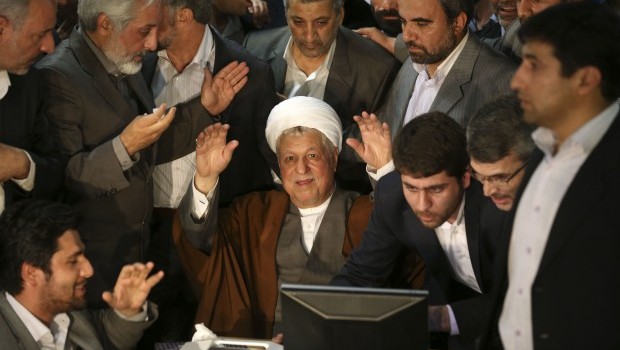
Former Iranian president Ali Akbar Hashemi Rafsanjani, 78, waves to media as he registers his candidacy for the upcoming presidential election at the election headquarters of the interior ministry in Tehran, Iran, on May 11, 2013. (AP Photo/Ebrahim Noroozi, File)
On Monday, a spokesman for the Islamic Republic’s Guardian Council, which is charged with vetting all candidates for parliament and the presidency, announced they would consider hopeful candidates’ health and physical condition in the vetting process.
Abbas Ali Kadkhodaei told the Iranian Arabic-language news network Al-Alam that “the law does not clearly state criteria for the president’s health and physical condition. However, Article 115 of the Iranian constitution states, ‘The President must be elected from among religious and political personalities’ … Obviously, such personalities must be in good health.”
He added: “Those who can be at their office for only three or four hours a day are not eligible to hold such a major position. Although there has not been much discussion over this particular matter, we might consider it [in the vetting process].”
Political analysts believe such comments are an indirect reference to the age of Ali Akbar Hashemi Rafsanjani. The former president, aged 78, is among the eldest of the individuals who have registered their candidacy for June’s election. If elected, he would be Iran’s oldest president to take office to date.
Ever since Hashemi Rafsanjani’s last-minute registration as a candidate for the upcoming presidential election earlier this month, there has been rampant speculation within Iran and among observers of Iranian politics about his chances of being disqualified. The speculation has focused on the public backing he has received from many reformists and the reported disagreements between him and Supreme Leader Ali Khamenei and conservatives loyal to the supreme leader.
This latest statement followed a high-profile Friday sermon delivered by the chairman of the Guardian Council last week, which some observers said contained veiled criticism of Hashemi Rafsanjani.
On May 17, Ayatollah Ahmad Jannati said: “A president should live a simple life, and the simple life should start with him. It means that his house, personal belongings, and the car he rides must be simple. A person who speaks of living a simple life but rides a [Mercedes-]Benz does not relate to people’s pain, does not understand when they speak of hunger, and does not have any sympathy for the working classes.”
Hashemi Rafsanjani is widely rumored within Iran to be a billionaire, thanks to his family’s involvement in Iran’s natural gas industry.
His opponents among the “principalist” faction of Iran’s conservatives, which is defined chiefly by its loyal to Ayatollah Khamenei, have been frequently critical of his candidacy since his decision to enter the race.
One principalist candidate, Gholam-Ali Haddad-Adel, an Iranian lawmaker, said in a speech on Monday that his principalist “Coalition of Three” was opposed to Hashemi Rafsanjani and his political views.
The coalition is comprised of Haddad-Adel, Tehran mayor Mohammad Baqer Qalibaf, and Ali Akbar Velayati, a senior advisor to Ayatollah Khamenei. All three men have registered as candidates for the presidential election.
Haddad-Adel said the coalition was formed because of their fundamental objections to Hashemi Rafsanjani’s political vision. Once the final list of candidates has been announced, the three men are expected to decide which of them will run as his opponent as the candidate for the principalist faction.
